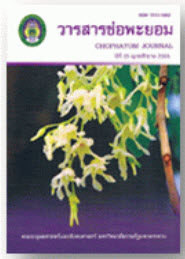ผลกระทบจากการขยายตัวของร้านค้าปลีกสมัยใหม่ ต่อร้านค้าปลีกดั้งเดิมในเขตพื้นที่กรุงเทพมหานครและปริมณฑล (The Impact of Modern Trade Expansion on Traditional Retail Stores in Bangkok Metropolitan Region)
Abstract
บทคัดย่อ
บทความวิจัยนี้ มีวัตถุประสงค์เพื่อศึกษา (1) วิวัฒนาการของระบบค้าปลีกในประเทศไทย (2) ผลกระทบจากการขยายตัวของร้านค้าปลีกสมัยใหม่และปัจจัยที่ก่อให้เกิดผลกระทบจากการขยายตัวของร้านค้าปลีกสมัยใหม่(3)นโยบายภาครัฐสำหรับการกำกับดูแลและการควบคุมร้านค้าปลีกสมัยใหม่และ(4)การปรับตัวของร้านค้าปลีกดั้งเดิมเพื่อตอบสนองต่อพฤติกรรมผู้บริโภคกลุ่มตัวอย่างที่ใช้ในการเก็บรวบรวมข้อมูล แบ่งเป็น 2 กลุ่ม (1) กลุ่มตัวอย่างที่ตอบแบบสอบถาม ได้แก่ผู้ประกอบการร้านค้าปลีกดั้งเดิมในเขต พื้นที่กรุงเทพฯและปริมณฑล จำนวน 400 คน ได้มาโดย การกำหนดขนาดตัวอย่าง โดยใช้สูตรทาโรยามาเน่ (อภินันท์ จันตะนี, 2549 : 70-85) และใช้วิธีการสุ่มตัวอย่างแบบง่าย(Simple Random Sampling) (2) กลุ่มตัวอย่าง ที่เก็บข้อมูลโดยการสัมภาษณ์เจ้าหน้าที่ภาครัฐ 5 คน และผู้ประกอบการร้านค้าปลีกดั้งเดิม 15 คน และผู้บริโภค50 คนโดยการเลือกแบบเจาะจง (Purposive Sampling) เครื่องมือที่ใช้ในการเก็บรวบรวมข้อมูล ได้แก่แบบสอบถาม และแบบสัมภาษณ์เชิงลึก การวิเคราะห์ข้อมูล เชิงปริมาณ ใช้สถิติดังต่อไปนี้ ค่าความถี่ ค่าร้อยละ ค่าเฉลี่ย และส่วนเบี่ยงเบนมาตรฐาน การวิเคราะห์ข้อมูลเชิงคุณภาพ ใช้วิธีการวิเคราะห์เนื้อหา (ContentAnalysis) แล้วนำเสนอเชิงพรรณาความผลการวิจัยพบว่า (1) วิวัฒนาการของระบบค้าปลีกในประเทศไทยสามารถแบ่งได้เป็น 5 ยุคดังนี้ ได้แก่ ยุคพ่อค้าสำเพ็งคุมตลาดค้าส่ง ยุคซัพพลายเออร์มีอำนาจกำหนดราคา ยุคผู้ค้าปลีกเติบโต ยุคร้านค้าปลีกมีรูปแบบหลากหลายและอำนาจเริ่มเปลี่ยนมาเป็นของผู้ค้าปลีก และยุคสุดท้ายคือยุคการขยายกิจการอย่างรวดเร็วของผู้ค้าปลีกขนาดใหญ่จากต่างประเทศ (2) การขยายตัวของร้านค้าปลีกสมัยใหม่มีผลกระทบต่อร้านค้าปลีกดั้งเดิมในด้านการตลาดมากที่สุดโดยเฉพาะในเรื่องการตั้งราคาสินค้า และ ปัจจัยที่ก่อให้เกิดผลกระทบจากการขยายตัวของร้านค้าปลีกสมัยใหม่ ได้แก่ สภาพแวดล้อมภายนอก เช่นนโยบาย กฎหมาย เทคโนโลยี และสภาพแวดล้อมภายใน เช่น การตลาด การเงิน การจัดการ (3) นโยบายภาครัฐที่กำกับดูแลและควบคุมร้านค้าปลีกสมัยใหม่ ได้แก่ นโยบายการค้าเสรี พระราชบัญญัติค้าปลีกค้าส่ง พระราชบัญญัติการแข่งขันทางการค้า พ.ศ. 2542 พระราชบัญญัติผังเมือง พ.ศ. 2518 พระราชบัญญัติว่าด้วยราคาสินค้าและบริการ พ.ศ. 2542 และบริษัท รวมค้าปลีกเข้มแข็งจำกัด และ (4) การปรับตัวของร้านค้าปลีกดั้งเดิมเพื่อตอบสนองต่อพฤติกรรมผู้บริโภค ควรมีการปรับตัวในเรื่องของด้านการตลาด การเงิน การจัดการภายในการบริหารงานบุคคล และด้านสารสนเทศผลการวิจัยได้ถูกนำมาสังเคราะห์เพื่อเสนอแนะในเชิงนโยบายและการบริหารจัดการธุรกิจค้าปลีกสมัยใหม่และร้านค้าปลีกดั้งเดิมได้กรอบยุทธศาสตร์การปรับตัวของร้านค้าปลีกดั้งเดิมจากผลกระทบของการขยายตัวของร้านค้าปลีกสมัยใหม่ คือ S = P–Service–M Synthesis Model (S: Survival, P: Policy, M:Management)
คำสำคัญ: ร้านค้าปลีกสมัยใหม่, ร้านค้าปลีกดั้งเดิม
ABSTRACT
The objectives of this research were to study (1) the evolution ofthe retail business system in Thailand, (2) the impact of modern trade expansionon the retail stores and the factors of the impact of modern tradeexpansion on retail business, (3) the government policies for regulatingmodern retail trade, and (4) the retail stores’ adaptation in response tochanging consumer behavior. The sample were divided into 2 groupswhich were (1) the sample answering questionnaire consisted of 400traditional retail store owners in Bangkok metropolitan region selectedfrom sample sizing by Yamane’s Formula and surveying simple randomsampling technique and (2) the sample involving in-depth interviews composedof 5 government officials, 15 traditional retail store owners, and 50consumers employed with Purposive sampling. The data collection toolswere questionnaires and in-depth interview. The quantitative data wereanalyzed by using percentage, arithmetic mean and standard deviation.Also, the qualitative data were analyzed by using content analysis andthe research results were presented by descriptive analysis.The results revealed that (1) the retail business evolution wascategorized into 5 periods namely wholesale control by Sampeng Chinesemerchants, retail price control by suppliers, growth of retail business,transferring control to retailers which had various business styles, and lastlyrapid expansion of retailers from overseas. (2) The impact of modern tradeexpansion on the retail stores was heavily on the marketing, especially onprice making. The factors of affecting modern trade expansion on retailbusiness were external conditions such as government policies, lawsregulations, technology, and the internal conditions such as marketing, finance, and management. (3) Government policies to regulate moderntrade retail business were free trade policy, retail and wholesale businessact, trade competition act of BE 2542, city planning. Act of BE 2518, priceand service Act of BE 2542, and united strong retail business companyLimited. (4) The stores’ adaptation in response to changes of consumerbehavior should be focused on marketing, finance, internal management,personnel management, and information technology.The research results have been synthesized in order to suggestbusiness policy, business management and administration of modernand traditional retail stores. The strategic framework for the adaptationof traditional retail stores affected by modern trade is S=P -service – Msynthesis model. (S: Survival, P: Policy, and M: Management)
Keywords: Modern Trade, Traditional Retail Stores






